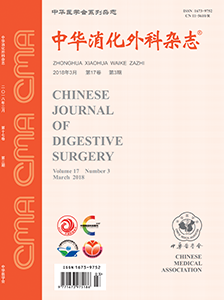Clinical application value of symmetrical three-hole laparoscopic sleeve gastrectomy
Q4 Medicine
引用次数: 0
Abstract
Objective To investigate the clinical application value of symmetrical three-hole laparoscopic sleeve gastrectomy (LSG). Methods The retrospective and descriptive study was conducted. The clinical data of 232 patients with obesity who were admitted to Zhengzhou Central Hospital Affiliated to Zhengzhou University from April 2017 to December 2018 were collected. There were 40 males and 192 females, aged (32±8)years, with a range of 17-63 years. All the 232 patients underwent symmetrical three-hole LSG. Observation indicators: (1) surgical and postoperative conditions; (2) complications; (3) follow-up. Follow-up was conducted by telephone interview and WeChat to collect the patient satisfaction with cosmetic effects of wounds at 3 months after surgery up to March 2019. Measurement data with normal distribution were expressed as Mean±SD. Count data were expressed as absolute numbers or percentages. Results (1) Surgical and postoperative conditions: of the 232 patients, 230 underwent symmetrical three-hole LSG successfully, without conversion to open surgery. Two patients had one puncture hole added due to spleen bleeding to help pull the omentum to stop bleeding, and no spleen hemorrhage recurred after improving the surgical procedure. Of the 232 patients, the operation time, volume of intraoperative blood loss, and duration of postoperative hospital stay were (115±7)minutes, (10±5)mL, and (3.0±0.8)days. (2) Complications: of the 232 patients, 10 had postoperative complications of fat liquefaction in the umbilical incision, and were cured after repeated dressing changes. All patients had no serious complications such as gastrointestinal bleeding, abdominal bleeding, or gastric fistula. (3) Follow-up: of the 232 patients, 230 undergoing successful symmetrical three-hole LSG were followed up for 3 months. Of the 230 patients, 3 were dissatisfied with the cosmetic effects of wounds, 12 were satisfied, and 215 were very satisfied. The satisfaction rate was 98.70%(227/230). Conclusion Symmetrical three-hole LSG is safe and feasible, with a good cosmetic effects of wounds. Key words: Obesity; Bariatric surgery; Bariatric and metabolic surgery; Symmetrical three-hole method; Sleeve gastrectomy; Laparoscopy对称三孔腹腔镜袖状胃切除术的临床应用价值
目的探讨对称三孔腹腔镜袖状胃切除术(LSG)的临床应用价值。方法采用回顾性和描述性研究。收集郑州大学附属郑州中心医院2017年4月至2018年12月收治的232例肥胖患者的临床资料。男40例,女192例,年龄(32±8)岁,年龄17-63岁。232例患者均行对称三孔LSG。观察指标:(1)手术及术后情况;(2) 并发症;(3) 后续行动。通过电话采访和微信进行随访,收集截至2019年3月手术后3个月患者对伤口美容效果的满意度。具有正态分布的测量数据表示为Mean±SD。计数数据用绝对数或百分比表示。结果(1)手术和术后情况:232例患者中,230例成功地接受了对称三孔LSG,没有转为开放手术。两名患者因脾出血增加了一个穿刺孔,以帮助拉动网膜止血,改进手术程序后没有脾出血复发。232例患者的手术时间、术中失血量和术后住院时间分别为(115±7)分钟、(10±5)mL和(3.0±0.8)天。所有患者均无胃肠道出血、腹部出血或胃瘘等严重并发症。(3) 随访:232例患者中,230例成功接受对称三孔LSG,随访3个月。230名患者中,3人对伤口美容效果不满意,12人满意,215人非常满意。满意率为98.70%(227/230)。结论对称三孔LSG是安全可行的,具有良好的创面美容效果。关键词:肥胖;减肥手术;减肥和代谢手术;对称三孔法;袖状胃切除术;腹腔镜检查
本文章由计算机程序翻译,如有差异,请以英文原文为准。
求助全文
约1分钟内获得全文
求助全文

 求助内容:
求助内容: 应助结果提醒方式:
应助结果提醒方式:


